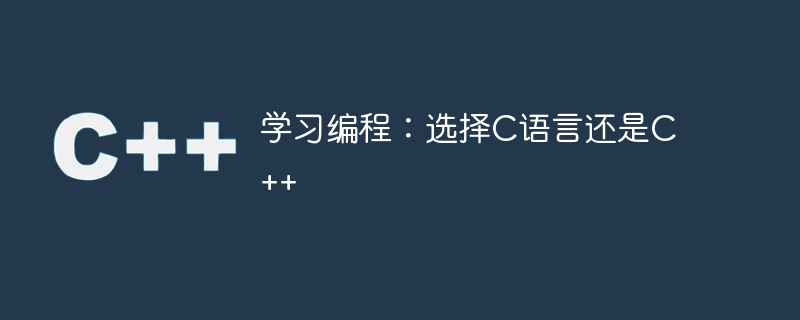

Learn programming: Choose C language or C, you need specific code examples
In today's digital era, programming is becoming more and more important as an important skill An object of attention and learning. Among many programming languages, C language and C have always been highly respected as traditional and powerful languages. So, for beginners, which language or language is more suitable? This article will compare the two in terms of language features, application scenarios, and specific code examples to help readers make a more informed choice.
First, let’s take a look at the basic features of C language and C. C language is a relatively simple and structured programming language. It mainly focuses on procedural programming ideas, and its syntax is relatively simple and clear, making it suitable for beginners to get started. C is an object-oriented programming language developed on the basis of C language. It inherits the characteristics of C language and adds object-oriented features, such as encapsulation, inheritance and polymorphism. Therefore, C is more convenient, but also relatively complex, when developing large projects and complex systems.
For beginners, if they just want to get started quickly and master the basics of programming, they can choose to learn C language. Below we use a simple "Hello World" program to compare the differences between the two:
C language example:
#include <stdio.h>
int main() {
printf("Hello, World!
");
return 0;
}C Example:
#include <iostream>
int main() {
std::cout << "Hello, World!" << std::endl;
return 0;
}As can be seen from the above example, C has more concept of namespace than C language, and cout is used instead of printf in C language. function. This reflects C's greater focus on object-oriented features, providing more powerful programming capabilities and richer library support.
In addition, it should be noted that the C language and C also have differences in some details, such as the handling of string processing, memory management, etc. will be different. The following takes a simple string processing as an example to show the difference between the two:
C language example:
#include <stdio.h>
#include <string.h>
int main() {
char str1[20] = "Hello";
char str2[20] = "World";
strcat(str1, str2);
printf("%s
", str1);
return 0;
}C Example:
#include <iostream>
#include <string>
int main() {
std::string str1 = "Hello";
std::string str2 = "World";
str1 = str2;
std::cout << str1 << std::endl;
return 0;
}As you can see, in terms of string processing, C provides a more convenient and safer string class, which avoids common problems such as buffer overflows in the C language.
In general, choosing to learn C language or C depends on personal learning goals and needs. If you just want to get started with programming quickly and master basic knowledge, you can choose to learn C language; if you want to learn object-oriented programming in depth and develop large-scale projects, then C will be more suitable.
We hope that the brief comparison and sample code in this article can help readers better choose a programming language that suits them and further explore the mysteries of the programming world. Learning programming requires continuous practice and accumulation of experience. I believe that as long as you study diligently, you will make progress regardless of whether you choose C language or C.
The above is the detailed content of Learn programming: Choose C language or C. For more information, please follow other related articles on the PHP Chinese website!




